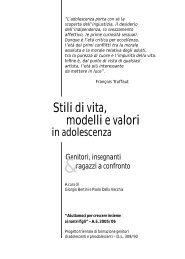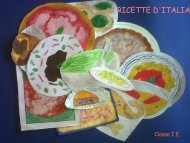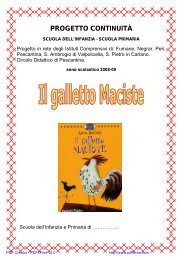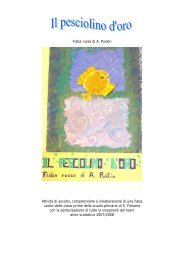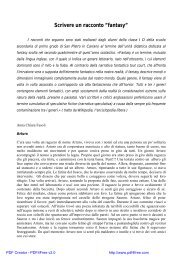poesia dialettale - Istituto Comprensivo Carlotta Aschieri
poesia dialettale - Istituto Comprensivo Carlotta Aschieri
poesia dialettale - Istituto Comprensivo Carlotta Aschieri
You also want an ePaper? Increase the reach of your titles
YUMPU automatically turns print PDFs into web optimized ePapers that Google loves.
ISTITUTO COMPRENSIVO “CARLOTTA ASCHIERI” – S. PIETRO IN CARIANO (VR)<br />
PROGETTO COMENIUS 2004 - 2005<br />
Tolo da Re
INTRODUCTION<br />
This poem is written in Veronese dialect (the dialect of the town). There are different<br />
dialects around Verona: the dialect of Lake Garda, of the mountain, of the southern part of<br />
the province.<br />
The author presents the river Adige as a person: he was born in the Alps, he comes down<br />
as a young and lively boy, he doesn’t want to stop, he serves in the army, he arrives in the<br />
town in love with Verona and he married her with a great feast. Then he leaves the town<br />
and he is very sad. He flows as slowly as a funeral. He flows then through the Po Valley<br />
and he dies in the Adriatic, always thinking of his beloved Verona.<br />
Such a poem in untranslatable, but we tried to prepare a glossary in order to translate some<br />
very funny expressions or whole sentences that help in the understanding of the poem.
Tolo da Re (1918 - 2005)<br />
His real name was Vittorio and he was born in Brescia, but his parents were from Verona.<br />
He wrote a lot of poems in Veronese dialect and his most famous one “L’Adese” was<br />
published in 1968. Many of his poems were published on the journal “L’Arena”, the daily<br />
newspaper of Verona. He wrote also pieces for the theatre in dialect and he received a lot<br />
of prizes. We chose this poem for the third part of our Comenius project in November 2004.<br />
He died in January 2005 and so with our work we wanted to honour his memory.
The Comenius project<br />
In our school we decided to work on this poem for the third part of the project of this year:<br />
“A poem, a legend, a story that presents our region”<br />
We worked in the second part of the school year and the five first classes (110 students)<br />
with their Italian, Art and Technology teachers were involved.<br />
The poem was divided into five parts, one for each first class.<br />
The students prepared a glossary from dialect to Italian with the Italian teachers.<br />
Then they had to learn their part of the poem by heart.<br />
They illustrated the poem with drawings.<br />
The last school day the students recited the whole poem before other students, teachers<br />
and parents, then they illustrated their part and then they described their drawings.<br />
Two classes worked also on the general description of the river (its course, the town on the<br />
river, the typical trees of the area, some news about the author, etc…) preparing posters.
The students of the first classes – 1 A B C D E - with their Italian teachers<br />
(Mrs Baffa, Gecherle, Manitta, Pavan, Pescimoro)<br />
and their English and German teachers (Mrs Lamberti and Lorenzi)
L‟Adese nasse italian da na mare todesca a Passo Resia,
El se destaca da la teta de giasso.
el scapa a salti, a sbrufi: discolo, garibaldin
- no gh‟è rosta che tègna, da Val Venosta, freda maregna, el vien zò a rebaltoni.
A Meran el sa fato i ossi. I vol scarparlo, imbragarlo. Gnente!
Descàlso el core, selvadego,
co l‟ocio verdegriso, con na canta mata tra i denti.<br />
Ai monti ghe ride le greste: tute rosse dal ridàr, iè.
A Bolzan l‟è un giovinoto vestì de pomari e de vegne co l‟‟ultima resina nel fià.
A Trento el va soldà: la caserma l‟è sul monte griso, insulso, pelado.
Iè scarponi le scomode rive, iè stelete le stele del cel.
I sogni dei vint‟ani i se impìssa, i se indrìssa, i va in oca, i se perde drio‟l canto<br />
verde de na ràcola, un gril.
Ala, Peri, Dolcé. La naia la fenisse, L‟Adese sliga el sangue.<br />
A Cerain el sbrega la divisa;
El spùa na parolassa contro el Forte de Rivoli tognin,<br />
el ghe volta la schena, el sbate via l‟ultimo ciodo de la crucarìa.
El se cava i scarponi, el core in sata, el respira, el se destira,<br />
el se veste de persegàri, l‟è mauro, l‟è morbinoso, el ga vòia de sposarse.
Pescantina, Parona, i vol fermarlo al Ceo:<br />
el baruffa con la Diga, el sbordèla,
el vinse, el passa.
Eco Verona, sotobrasso de Ponte Castelvècio, l‟è tuta bela,
tuta ciara e calda. L‟Adese l‟è imamado, l‟è in confusion, l‟è timido,
el se petena, el se lustra, el se veste de muraiòni,
el se méte in testa i ponti, el canta de tuta vena.
Adesso el se scadéna, el ciapa fià, el la basa. Co na “esse” el la brinca tutta,
co na “esse” el la ciama Sposa.
“In eterno! In eterno!” sbroca tute le campane.
Nono Rengo el se desmìssia, el stranuda, el se incocòna, el discòre come un<br />
sindaco, el se torna a indormensar.
Castel S. Piero l‟è un altar. Fiori bianchi iè i cocài: i ga in beco un “si”<br />
bramoso. “In eterno! In eterno!”
le campane no ga più vosse, le va in leto a una a una. Ponte Nave, Dogana.<br />
Al Camposanto l‟Adese capisse
adio Verona, adio Verona.
L‟Angelo da la<br />
tromba el saluda<br />
co na sonada<br />
ingiassada, dura,<br />
garba, fàta de<br />
làgreme e de<br />
piera.
L‟Adese el se dispera, el camina come un òbito, el ga l‟anima de un vedovo,<br />
el se smòrsa, el se trascura, el se spòia de muraiòni,el se lassa la barba longa,
el tase tuto, el vol morir. Al Ponte de la Ferovia el struca i denti,
el scantòna, el vol desmentegàr Verona, el vol tornar baléngo, desbriàdo, e<br />
che la vita torna a sventolàr.
El camina de onda, el riva al Porto,
el buta l‟ocio a l‟ultima montagna.
A San Michel el sfodra la campagna,
Boche de Sorio, Zevio. Eco la Bassa
svacada nel lùame, rassegnada, descàlsa,
dai giorni imbriàghi de sol, da le noti in man a le rane.
L‟Adese el se<br />
impisola, el mete<br />
pansa, el rònfa: nasse<br />
sogni pitòchi, cuciàdi,<br />
stofegàdi. Albaredo,<br />
ècolo che‟l se svéia:
l‟è rabioso, l‟è dispettoso, el camina a bissabòa.
A Legnago l‟è cativo, el fa dano,el se ribela, l‟ocio neto el ghe se intòrbola,<br />
no‟l dorme più, no‟l ride più.
Gh‟è qua la Tera Polesana che l‟è na mare straca de fiolar, agra, monta,<br />
grendenàda: la se spalanca a Badia con na ragosa e dura <strong>poesia</strong>.
L‟ Adese ormai l‟è sordo, el coa el so morir come i veci, l‟è un vecio,<br />
la fumara ghe fa bianca la barba.
Al campanil de Cavàrzere el sente „l mar nel naso. El sospira, el capisse,
el lassa un testamento:”Le me aque a la gente vèneta, a Verona l‟anima mia”.<br />
Dèsso l‟è in agonia: el rantola, el se sbianca,
el se tàca a la tera, el spalanca la boca come par saludar.<br />
Ormai l‟è quasi mar. Eco, dèsso l‟è mar.



